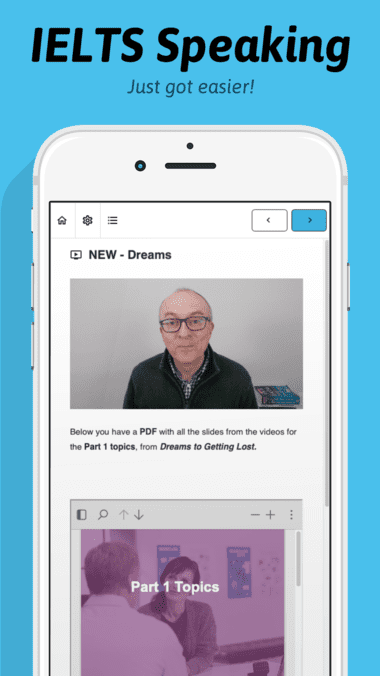IELTS Speaking Part 1

Table of Contents
What happens in IELTS Speaking Part 1?
Many students struggle in IELTS Speaking Part 1 because they are not sure what to expect. The examiner may do or say things that can surprise the student and so make them more nervous than they already are. Let’s make sure that doesn’t happen to you.
Here is exactly what happens in Part 1 of the IELTS Speaking test;
- When you enter the speaking test room, the examiner greets you.
- The examiner will start to record the interview (audio)
- The examiner asks for your ID
- They (he or she) asks your full name
- They ask you two or three introduction or ‘warm up’ questions about either
- Your home
- Your hometown
- Your work
- Your study
Common 'warm up' questions
Part 1 of the test begins with some ‘getting to know you’ questions.
The kind of questions you ask someone when you meet them for the first time.
So, you may get questions similar to these below. Note, these are not official IELTS Speaking Part 1 questions.
Hometown
- Do you like your hometown?
- What’s a popular part of your hometown?
- Are there many shops in your hometown?
Home
Talking about your home
- Do you live in a house or a flat?
- What’s your favourite room?
- Is there anything you want to change about your home?
Talking about your accommodation:
- Tell me about the kind of accommodation you live in?
- How long have you lived there?
- What do you like about living there?
Work
- Do you work or are you a student?
- What do you do everyday?
- Do you enjoy your job?
Student
- What do you study?
- What do you like most about your study?
- Why did you choose to study that?
Get a free lesson for this video with lots of IELTS Speaking Part 1 tips and tricks.
IELTS Speaking Part 1 questions
The ‘warm up’ is important, but the real evaluation begins after the warm up.
After the warm questions above, you will get around 3 to 4 questions on 2 different topics.
In Part 1 of the IELTS Speaking test, you will be asked a series of very similar questions, but on a wide range of different topics. The questions will be about you and your everyday life.
Types of Part 1 questions:
- Do you like ______? Why?
- Did you ____ as a child?
- What are your favourite _____?
- How often do you do ______
- Is this important to you?
- Is this common in your country?
Examples of IELTS Speaking Part 1 questions:
- Do you cook?
- Do you like cooking?
- Did you cook as a child?
- What is your favourite kind of food?
- How often do you cook?
- What is a popular dish in your country?
IELTS Speaking Part 1 topics
The topics for IELTS Speaking change on a regular basis, but there are some common topics that come up, and within these topics there are plenty of sub-topics that might apear.
Below, you will see the kind of topics that are common in IELTS Speaking Part 1.
Study as many topics as you can so you can speak and use vocabulary flexibly “to discuss a variety or topics“ (According to the offficial IELTS Speaking Band Descriptors)
For each topic below, you will see some sub-topics. The sub-topics are useful areas to study in order to broaden your vocabulary and flexibility to talk confidently on that topic. They are also useful to study because any of these sub-topics cold also be a Part 1 topic.
Click on a topic below to get study materials to practice your speaking skills for IELTS Speaking Part 1.
Keeping pets, wild animals, zoos
Visual and performing arts, types of paintings, art galleries and exhibitions, studying art at school, art in your home, digital art
Genres of books, digital and audio books, books you have read, books made into films
Hometown, location, local industry, tourism, activities to do, likes and dislikes
Likes and dislikes, shopping for clothes, clothes at work / for leisure, clothes fashion, accessories (e.g. belts, hats, bags, jewellery, etc…)
Different uses, learning how to use a computer, problems and challenges
Living in the coutryside, comparisons to city life, challenges, possible work or jobs
Different members, their jobs, hobbies and personalities, your relationships, time you spend with family
Picnics, cooking, eating habits, healthy eating, favourite dishes, snacks, fast food
Describing friends, relationships, kinds of friends, activities with friends
Daily habits, good and bad habits, work routines, family habits, changing a habit
Staying healthy, keeping fit, sports, sport at school, public health and fitness facilities
Descriptions, location, types, rooms, furniture
Activities, types, challenges, ideal job, changing job
Uses of a mobile phone, apps, texting, social media
Likes, different kinds, how and where you listen, creating or playing music, musical instruments
Taking photos, different kinds of photos, skill of taking photos, phones and cameras
Different kinds, habits, doing sport, watching sport, being a fan
Ability, techniques, school, teachers, concentrating, exams, places to study
Means of transport, public and private transportation, sea, land and air transport
Ways to travel, preferences, destinations, holidays
Favourite weather, preferences (hot or cold), weather forecast, changes in weather and climate, weather and seasons
The topics in blue above have a link to either a full free lesson or a video.
_____
Get Free access: All My IELTS Speaking Live Lessons
_____
Crack IELTS Speaking Part 1
FREE Online Course!
Master Part 1 of the test so you can face the examiner with confidence and ace the IELTS Speaking test!
How to prepare for IELTS Speaking Part 1
Get familar with the common Part 1 question types
Don’t prepare answers to all the IELTS questions you find on the Internet.
- Having prepared answers will make you sound unnatural
- You may get different questions; don’t trust everything you read online!
- There are too many topics and questions to prepare.
Focus your preparation on learning how to speak on differernt topics, not how to answer lots of questions.
- Look at the bigger picture, your life long learning of English is more important than passing IELTS
- Learning the language you need to talk on many topics will make you better preapred for IELTS
- Aim to talk flexibly about a range of sub-topics even within each topic.
Don’t focus on technical vocabulary or dictionary definitions.
- You don’t need to be an expert on topics like science, art, geography or history. It’s more important to speak naturally.
Part 1 strategies
The most important thing to remember is Part 1 questions are about you and your life. They are specific, not abstract. Save the abstract and general ideas for Part 3.
- Focus on spoken English. If you think you sound like an expert or an academic, then stop – you are probably using inappropriate, written vocabulary.
- Get to the point – give simple direct answers.
- Keep talking – even if you have to make something up, it is better to say something, rather than keep quiet.
- Remember – you don’t have to tell the truth! The examiner marks your English, not your ideas or content.
You don’t need to be an expert on topics like science, art, geography or history. It’s more important to speak naturally.
Quick tips for Part 1
- Imagine the examiner is a new friend you have just met at a party
- Pause and think before answering
- Keep your answers short and simple
- Use collocations
- Use some adjectives to add colour and interest
Useful phrases for Part 1 answers
One of the most common questions in IELTS Speaking Part 1 is about things you like, such as…
- Do you like music?
- Do you like coffee?
- Do you like social media?
You could answer with these phrases
Yes, I’m a big fan of music, in particular, Jazz music
For sure, I’m really fond of coffee
Yes, I can’t get enough of it
Answering in the negative
No, I’m not really one for coffee
No, I’m not really into music
No way, I can’t stand social media
Developing your answer
- Do you like science?
Yes, I do. What I like most about it is ____
Add an adjective clause
What I like most about it is it’s so interesting
What I like most about it is it’s so useful
Give an example
What I like most about it is it’s so interesting, for example, last week I read an article about solar panels and how we can use them
Bonus links
Now you can go on and find out about Part 2 and how best to prepare for it.


